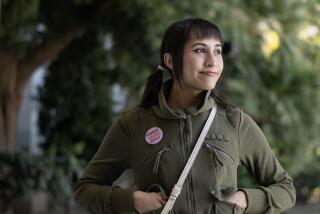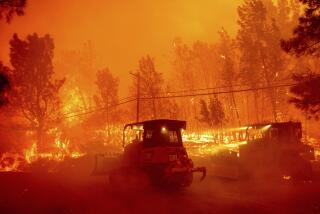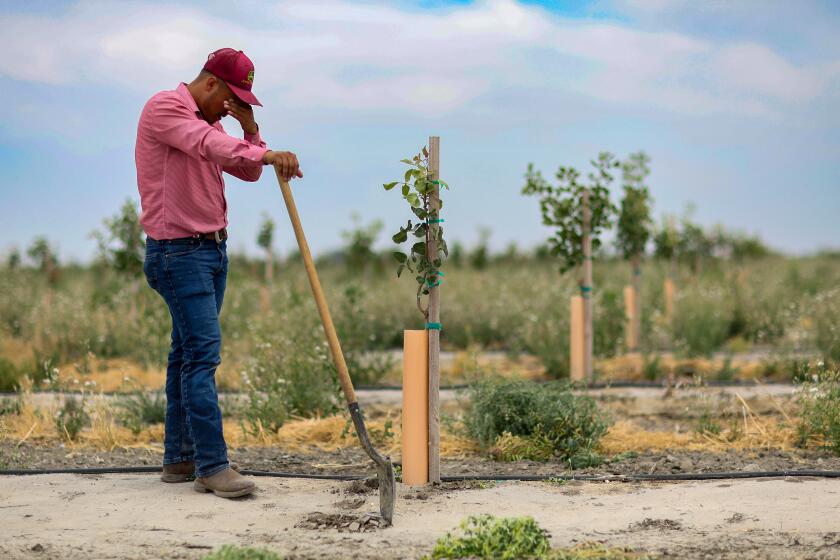Children With AIDS--Learning to Lie
There is not much to be said that they have not already heard, or said to themselves.
But they say it anyway, in company of the mere handful of people in all of Los Angeles who can understand.
If I’d known this was going to happen, Wayne is telling them in a voice pulsing with bitterness, I’d have pulled the plug on my boy before it got started. The others rock their heads--yes, yes, they had thought about that too.
I bring homemade cookies to work, and no one will touch them, because my boy is sick, Wayne says. I go to the bathroom, and no one will use the toilet stall I used, because my boy is sick. The gay men and gay women, they’re all out in the street, saying, ‘We’re out of the closet now,’ but us-- we’ve got children with this. We’re stuck in the closet.
These are the parents of children with AIDS. They cannot make all the plans other parents make, for vacations and piano lessons. Their plans are for tests and treatments, a week, a month away, and their choices are the despairing, chancy trade-off between frankness and ostracism, or secrecy and isolation.
And because of a disease they had barely heard of four years ago, they have all learned to lie, grimly or airily, and with hardly a pang, for the sake of their children.
So these are not their real names: things are hard enough as they are.
- Hard enough to make Guatemalan-born Maria struggle with her culture and her Catholicism, to abort a pregnancy and be sterilized after she and her youngest child and her second husband all acquired the AIDS virus from her drug-addict first husband. Hard enough to prevent her from applying for amnesty because AIDS would disqualify her. “All the Latinos come to find a better life,” she says, “and look at me.”
- Hard enough that Cindy concocts stories of happy family life to take to work on Mondays, in case anyone asks about her weekends. “It’s like two different worlds I live (in),” she says. “In one I have this imaginary family, the way I wish it could be. And the other is the way it really is.”
This is the way it is: her high-school-sweetheart husband lies nearly blind and bedridden, dying of acquired immune deficiency syndrome that he caught while dating when they separated over his alcoholism, and weeping because he cannot even kiss his 2-year-old daughter, Ann, since she, like her mother, is AIDS-positive. And Cindy and Ann are trying, with hope and health food, to defuse the ticking time bomb of the virus.
At a support group for parents at Childres Hospital of Los Angeles--one of five comprehensive pediatric AIDS programs in the United States, and the only one in the West--these parents can unburden themselves to people who share a tragedy that is statistically minute, but personally enormous.
Children account for a small but growing fraction--perhaps 2%--of the nation’s AIDS cases. Some of them received tainted blood; others had it transmitted from parents who themselves got bad blood or shared infected intravenous needles.
And the parents complain that the support and services available are more than comparably minuscule. “There’s nobody out there,” one father complained, “nobody to tell me what was going on.” One local AIDS hot line referred a frantic mother of a 5-year-old to a group called Mothers of AIDS Patients. They were mothers, all right--but their children were adult homosexuals.
“It’s like we don’t even exist,” says Liz, whose 4-year-old, Alex, has AIDS complex. “There’s something almost every day in the news, in the paper about gays, but never about the kids.”
The anguish and anger and self-reproach of parents who shoulder AIDS’ social stigma for their youngsters is vast. Gauge its enormity by the fact that many will tell even friends that their children have cancer, because cancer is “better.” With cancer, people do not shun, they sympathize.
Alex was given a stranger’s blood after a 1984 accident, at a moment when a dozen relatives were clamoring to donate blood because of fears about AIDS. Two years later, the call came: the stranger’s blood was bad. Alex’s parents are suing the hospital.
But too many people know about Alex already. Look at that Atascadero boy with AIDS, Ryan Thomas, whose parents went to court to keep him in kindergarten, Liz says. He got “run out of town or kicked out of school or whatever. I don’t want that. I don’t want people banging on my door. I don’t want that to happen to (Alex) and I don’t want it to happen to us.”
Want Understanding
But what they do want is this: for people to understand that children are slowly dying because of a virus, not a vice, a biological scythe that does not distinguish by age or wealth or sexual inclination among those it lays low.
Hal’s wife was diagnosed as having AIDS and and died of of the disease all within three weeks, and his daughter, Megan, is AIDS-positive. At work, Hal can only smile mirthlessly when people who don’t know his torment kid him: Hey, buddy, now that you’re in the dating game again, you have to watch out for that AIDS stuff.
Someday, Hal--whose initial impulse was to make his daughter “the AIDS poster baby”--will tell them all.
“This way they’ll say, ‘Oh, I can put a face on it,’ and it’ll make more sense to them, a face that’s human rather than (just) gay. That’s what it’s going to take. . . . It just started there (with gays) and it’s too bad it did, because it’s become a political disease rather than just a disease.”
Among them, these seven parents in a conference room at Childrens Hospital have four children whose conditions range from AIDS-positive to full-blown AIDS. Two other parents, of two other children, also were interviewed for this story.
Under its strict AIDS criteria, the Los Angeles County Department of Health Services counts about 20 children under 13 with the disease. But Dr. Joseph A. Church, co-director of the hospital’s AIDS program, surveyed 11 local pediatricians and found about 200 children AIDS-positive or with varying AIDS manifestations.
The people here are a statistical minority within a minority: They are white and middle class. AIDS came to them through tainted blood products, before blood began being screened for AIDS in 1985. In the East, most are black or Latino children of drug abusers. AIDS groups here--including the hospital, where October is AIDS Education Month--are trying to educate Los Angeles minority communities to preclude that.
“How can I say it?” Maria asked. “Because for us Latinos . . . they’re afraid, but they have to understand and be educated to this. If we had a little education before, in the schools and places, and in the news, I think that none of this would have happened.”
Only One Real Statistic
For each parent, there is but one statistic that matters: one child--theirs.
Hal’s daughter, Megan, is AIDS-positive (there are some children who, years after a bad blood transfusion, remain in good health). Wayne and Judy’s 5-year-old boy, Mark, has pneumocystis, a classic AIDS lung ailment, and has dwindled to 18 pounds.
Parents ride the pendulum between hope and reality, and their anger is often proportionate to the state of their child’s health. The sick kids’ parents remember when theirs were well, and those whose children are still well are haunted by the haggard faces of the parents of the dying.
Liz: “What scared me was hearing theirs . . . because it’s started (with Alex). It’s going to happen. We’d go home and say, ‘No way.’ And now it is.”
Wayne: “We’re watching him die, that’s what we’re doing. . . . Our boy is on a DNR list. You know what DNR means? Do not revive.”
Learned What Was Wrong
They learned last August what was wrong with him.
Judy: “He walked, he talked, he was potty trained, he played, he laughed, he did everything. . . . (Now) he’s back on diapers, he can’t even say mommy any more--he used to talk very good. Not one word comes out of his mouth. He doesn’t even have tears when he cries.”
Wayne: “. . . Because somebody’s life style or somebody’s blood that they wanted to give to be a good citizen to this country is killing my boy right now. Our two other kids, they don’t know about this, because I don’t want them to be persecuted in school for it. Mouths have a tendency to talk; that’s a fact.”
Marcy Kaplan, the project’s coordinator and clinical social worker, advises parents “not to tell, because as much as we’d like this disease to be thought of as any kind of a chronic illness,” it is not. People do not throw rocks or send hate mail to those with tuberculosis, or leukemia.
Folks who always turned in crisis to friends or relatives suddenly did not--or did, and sometimes regretted it.
‘How’s Your Baby?’
Liz: “I’d been back (at work) two weeks and this one girl I work with says, ‘How’s (Alex)?’ And I thought she knew . . . and I started telling her and she says ‘Omigod!’ I have a baby that’s 18 months old, and she says, ‘How’s your baby? Is she OK?’ And I said, ‘Do you mean do I have it?’ Because that’s what she’s asking. I thought the people I work with (were) good friends.”
Wayne: (whose best friend from childhood dropped him when told that Mark has AIDS): “Good friends don’t count.”
Karen and Roger’s daughter, Deirdre, was premature, and the blood that initially saved her life has now jeopardized it.
Karen: “If I had it to do over again I wouldn’t have told any of my friends, frankly. They’re never around.”
Roger: “They’re all gone. The best man at your wedding. The guy you grew up with.”
Karen: “One called the other day and said, ‘Has she got full-blown AIDS yet?’ ”
Roger: “I guess they’re waiting till she dies and then they can come over.”
Feel Set Apart
If they tell or if they don’t, they feel suddenly set apart from the rest of the world’s niceties.
“Can you imagine?” Hal says. “I have to go back to work . . . and I’m a little depressed, my wife had died less than a month earlier and I’m sitting there, and my kid is showing signs of the disease, and they me ask what’s wrong. And I can’t tell them what’s wrong with my kid.”
Maria’s uncles and their families shun the woman who once loved nothing more than parties of relatives and friends. “Night and day, I feel abandoned.” Only her brother and his wife visit her and her three boys, and they embrace them all, the sick and the well.
For Cindy, those that she has told have supported her, including her parents, who still blame Cindy’s dying, contrite husband, whom she still loves “more than anything.” At the same time, she must set up a new and circumscribed life for herself and Ann, who can’t go back to preschool because of her vulnerability to other children’s sniffles. Ann still stands at the window and looks out longingly, calling “Kids, mom!”
Ignorance Replicated
Five years ago, these people who now talk of platelets and T-cells could not have told you what AIDS was. Now they see their own ignorance replicated, in people who shun these children but still play nonchalant sexual roulette.
Said Karen: “I didn’t know anything about it. I only thought gays got it too.”
Roger: “I figured God was giving them the disease to get rid of them.”
Hal: “I was one of those who thought it was God’s revenge on gays, that was it.”
Kevin: “That’s how I felt, too. . . . It’s like now we’re being punished for saying that.”
Liz heard secondhand that her brother intended to sterilize all of his children’s toys anytime Alex visited. Forget that, said Liz--my boy will never visit. But after calling hot lines and reading articles, her brother backed down.
“If I was scared I was going to get something,” Liz says, “I’d want to find out, I wouldn’t just sit in a corner. I don’t see why they don’t educate themselves.”
Not Afraid Any Longer
Hal’s two little nieces are not allowed to see his daughter now. Last year, after his wife died, “I had a hard time when she first came home,” he admitted. “I just looked at (his daughter) and thought, ‘Jesus Christ, am I going to get it from this kid?’ I’ve gotten over that. I slept with my wife for seven years when she was positive so, if I’m going to get it I would have gotten it.”
Judy: “That’s what I said about my son. I had him for 3 1/2 years before I found out he had it--I kissed him, I hugged him. . . . Just because he has it now, I’m not going to stop.”
What resentment they bore toward homosexuals has abated. Their bitterness is that political clout, and scarce experimental drugs such as AZT are largely for adult victims, who are mostly gay. (A child’s metabolism is different from an adult’s, and there are lab studies under way, but “as far as many of us are concerned,” Dr. Church said, “those studies are taking an awful long time to get done.”)
Wayne: “Why can’t we get the new drugs?”
Liz: “Because of the side effects.”
‘My Boy’s Dying’
Wayne: “Damn the side effects, my boy’s dying. . . . What’ll happen, he’s going to be dead and they’ll say, OK, we can experiment on kids. That’s going to be real great for us, huh?. . . . You guys’ll have a chance to use it, but our boy? Huh-uh.”
They know now of AIDS’ catastrophic serendipity. It has set them apart from the family next door, this tiny virus. But from behind their pseudonyms, they yearn to say that in their ordinariness is their credibility.
“People think they shouldn’t know, because what can they do? But there’s a lot they can learn,” Hal says reflectively.
“First, it’s a disease and you have to think of it as a disease. But it’s a disease that’s growing. And you’d better take it seriously. Maybe it’s not in your backyard right now, but it’s coming, and when it comes, it’s just really going to rock the whole foundation of this country. They haven’t figured out the common cold yet, and this could really be a monster.”
More to Read
Sign up for Essential California
The most important California stories and recommendations in your inbox every morning.
You may occasionally receive promotional content from the Los Angeles Times.







